Kelly Hall broke a major rule of negotiation when she was interviewing for her current job at product protection startup Clyde.
She'd gotten an offer to join Clyde as VP of Channel Strategy and wanted to take it, so she went to tell her previous employer she would be resigning. But instead of accepting her resignation, they responded with a surprising counter-offer. She brought it back to her hiring manager at Clyde, who happened to also be the CEO, and waited for his response.
Using a counter-offer to drive up a starting salary is a classic negotiating move, and one that we've encouraged women to consider. But the waiting was getting to Kelly—"I was losing my mind, emotionally," she remembers—so she reached out to her former employer and told them that she couldn't accept their counter, then got back in touch with her future boss and told him what she'd done.
Even though she could've kept negotiating, Kelly wanted to start her new job off with as much transparency as possible. "I believe that honest communication pays higher dividends," she says. "So it was important to me to let him know that I had officially declined the counteroffer."
What are rules good for, anyways? They're guidelines to help you get what you need, and when they work, that's great. But Kelly learned that following her instincts and her values got her to where she needed to be in the end. (Including with her offer: Clyde's CEO came back with what she calls "a very compelling addition to the original offer," even after knowing she'd turned the counter down. She accepted it and joined the team a couple of months ago.)
We sat down with Kelly to talk about her career path, the framework she used when deciding to leave a large, established company to join Clyde (a startup), and her tips for other women who are negotiating job offers with startups.
From startups to major players and back again
Kelly's current role as VP of Channel Strategy at Clyde has her focusing on understanding new verticals and markets, determining how to position the company within them to reach their target market. Though she's excited to be part of a fast-growing team, she acknowledges that for her, having worked for enterprise-level companies helped her to get to this point. "Personally, I think I'm in a better position to be successful because I'm bringing experience into the startup. I don't know that I would've been able to pull this off as my first or second gig; I wouldn't have had the foresight or experience to really shake things up had I made this leap earlier," she explains.
When Kelly kicked off her career in sales, it was with a small company called Hands On Systems that provided billing for mobile carriers right as mobile and internet technology were converging. "It was literally guys in their garage who built this platform," she says. She loved the fast-paced nature of scaling her sales as the market grew.
When that company was acquired by Verisign, she found herself transitioning into a much more structured environment. "It was 'small and scrappy' versus 'large and secure,'" says Kelly. "In a smaller organization, you have the opportunity to touch things more directly, which I love. But there's something to be gained from working at a larger organization that has tremendous resources and support."
Kelly then spent several years working with other big players (Asurion and AmTrust) before she met the Clyde CEO and COO, Brandon Gell and Jereme Holiman, at the Consumer Electronics Show in Vegas this year. She'd been running into issues in her sales cycle and realized she didn't have the resources to solve them. "It started to be apparent that a partnership with Clyde could move forward some of my other deals," she says. Kelly set up a dinner with their team, thinking they could discuss that objective. She walked out of the dinner with a job offer.
Deciding to make the leap: a framework for joining a startup
Kelly didn't take the job immediately. Although she was very interested, she wanted to make sure to do her due diligence. Her process for deciding went as follows:
- First, she checked the financials. She wanted to make sure that the company was well set up financially, so she asked the founders to circle back with her once they'd raised their Series A round of funding.
- Then Kelly asked for investor access, with the goal of understanding their belief in the company. "The bigger the investor, the more open the dialogue, I found," says Kelly, who encourages women considering taking a high-level role at a startup to do the same. "It lends insight from another perspective."
- She also wanted to make sure she liked the people and not just the investors. "I've always prioritized working in a company with people you really like. And that was my experience with the Clyde team," says Kelly, who appreciates the company's focus on creating a positive working environment with a diverse group of employees.
- It was also important for Kelly to understand the role and its growth potential. "A startup gives you an opportunity to do a lot of different things—including stuff you're probably not even qualified for," she says, smiling. "I asked questions around the role itself, but also how I'd interact with other projects because I think it's really important to own your career path."
- Then it was time to listen to her intuition. "It's our greatest ally," she says. "If you listen, the answers are always there." She was excited about the company and their vision and knew it was the right move for her. "It felt like their platform was just coming at the perfect time. This industry needs it."
Before officially accepting the job, Kelly asked herself three questions she'd learned from a previous mentor for how to evaluate a new opportunity:
- "Am I being paid fairly? Am I learning? And am I having fun?"
Clyde seemed like it would check all of those boxes for her, so it was time to move forward—and into that fateful negotiation.
Negotiating salaries at a startup as a woman
To prepare for her salary negotiation, Kelly did start by following the "rules." First, she did her research on what the market range looked like for the role. "Sometimes we miss that step and go in with a growth percentage on top of our previous salary, thinking, 'Oh, if I can just get 10% more than I'm making now, I'll be happy.'" she says. But she wanted to have a solid base rooted in fact, so she came up with a number that she felt represented her worth and the market.
"Then you beef it up a little bit," she says. "Go for it, but don't get too crazy!"
That's the number she went into the negotiations with. As she was working through Clyde's offer, her then-employer's counter, and the final package, she had to consider equity and other benefits, too. "Even though I obviously believe in the vision, my advice is that you can't really bank on equity," she says.
One thing that did stand out to her as a clear pro and added value (beyond salary), was Clyde's open vacation policy. "Early in my career, I was wired to believe that being busy and not taking vacation was a medal of honor. And I learned very quickly that it's just going to burn you out. I really loved that Clyde's policy is to take as much vacation as you'd like as long as you're performing," she says. She was pleased with the company's vacation fund matching, too, where employees can allocate a percentage of their paychecks for vacations, which Clyde matches up to a certain point.
"You have to look at your package from both a financial perspective as well as flexibilities or perks that go a long way in terms of your mental space and happiness in your role," says Kelly.
Even though she was negotiating this particular offer just as the Coronavirus pandemic was beginning, Kelly didn't settle for less than what she thought she deserved. "Barring situations where your livelihood is at risk, you shouldn't lose sight of your worth," she says.
And as we revealed above, it all worked out. She suggests that women looking to join startups follow her same approach—even if it means backing off from some of the traditional ways of negotiating. "In trust-basedrelationships, there's really no negotiation," she says. "If you know your value and your company knows your value, it's really just a discussion on what will make it feel like you're making the right decision."
Kelly's first few weeks with the Clyde team have confirmed to her that she did indeed make the right decision. If you're interested in joining her, follow Clyde's page for updates on open roles.




